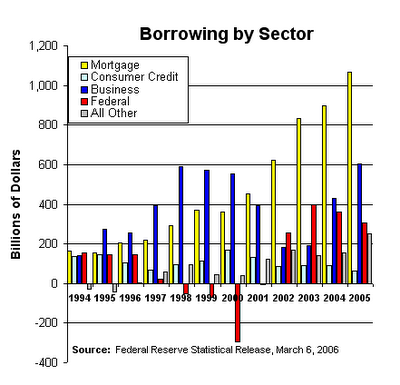Nearly two months ago, Nancy Pelosi and other House Democratic leaders introduced the "First 100 Hours" plan to clean up our nation's capitol and move our country forward. Here's another look at the plan and our take on it.
Day One: Put new rules in place to "break the link between lobbyists and legislation."
Day Two: Enact all the recommendations made by the commission that investigated the terrorist attacks of Sept. 11, 2001.
Time remaining until 100 hours:
The other policy goals will assist Americans in need, boost the economy, and help put an end to the Republican war on science. And lest you think all the action will be over after the first 100 hours, here's a note from Pelosi, written on Election Day:
Day One: Put new rules in place to "break the link between lobbyists and legislation."
Day Two: Enact all the recommendations made by the commission that investigated the terrorist attacks of Sept. 11, 2001.
Time remaining until 100 hours:
- Raise the minimum wage to $7.25 an hour
- Cut the interest rate on student loans in half.
- Allow the government to negotiate directly with the pharmaceutical companies for lower drug prices for Medicare patients.
- Broaden the types of stem cell research allowed with federal funds ("I hope with a veto-proof majority," she added in an Associated Press interview Thursday.)
The other policy goals will assist Americans in need, boost the economy, and help put an end to the Republican war on science. And lest you think all the action will be over after the first 100 hours, here's a note from Pelosi, written on Election Day:
In 100 hours, the top five oil companies will take in $4.3 billion in profits.The Democratic Congress can't even begin to tackle most of our nation's pressing problems in just 100 hours. But that doesn't mean they can't get started.
In 100 hours, $1.1 billion will be spent on the war in Iraq.
In 100 hours, the public debt will grow by $4.9 billion.
In 100 hours, the top 10 pharmaceutical companies will gain $2.6 billion in profits.
In 100 hours, the top CEOs will earn an average of $2 million each.
In 100 hours, a minimum wage worker working 8 hours a day will earn $171.67.
And if all goes as expected, in less than 100 hours my sixth grandchild will be born.
I want my grandchild to be born into an America where government is for and by the people. I want my grandchild to be born into an America that rewards and values hard work. I want my grandchild to be born into an America where you are not labeled a terrorist coddler when you honor the Constitution.
I want my grandchild to be born into an America where if the U.S. Central Command judges the situation in Iraq to be near chaos, with "violence at all-time high, spreading geographically", if the top intelligence agencies tell you that the war in Iraq is inspiring the very terrorism it was purported to prevent, and if four highly respected military newspapers say of the Secretary of Defense that "his strategy has failed, and his ability to lead is compromised...[he] must go" that you fire your Secretary of Defense and change the course.
I want my grandchild to be born into an America whose government honors its duty for accountability and oversight.
I want my grandchild to be born into an America that inspires innovation, that leads with dignity and diplomacy, that rejects fear mongering, and whose leaders start each day remembering that the Constitution begins with the simple but revolutionary phrase "We the people," which announced to the world that here, the people rule.
If you honor Democratic candidates with your vote today, in the first hundred hours of a Democratic Congress: We will restore civility, integrity, and fiscal responsibility to the House of Representatives. We will start by cleaning up Congress, breaking the link between lobbyists and legislation and commit to pay-as-you-go, no new deficit spending.
We will make our nation safer and we will begin by implementing the recommendations of the independent, bipartisan 9/11 Commission.
We will make our economy fairer, and we will begin by raising the minimum wage. We will not pass a pay raise for Congress until there is an increase in the minimum wage.
We will make health care more affordable for all Americans, and we will begin by fixing the Medicare prescription drug program, putting seniors first by negotiating lower drug prices. We will also promote stem cell research to offer real hope to the millions of American families who suffer from devastating diseases.
We will broaden college opportunity, and we will begin by cutting interest rates for student loans in half.
We will energize America by achieving energy independence, and we will begin by rolling back the multi-billion dollar subsidies for Big Oil.
We will guarantee a dignified retirement, and we will begin by fighting any attempt to privatize Social Security.
I say this as a grandmother (of almost six) and as the Democratic Leader of the U.S. House of Representatives.





